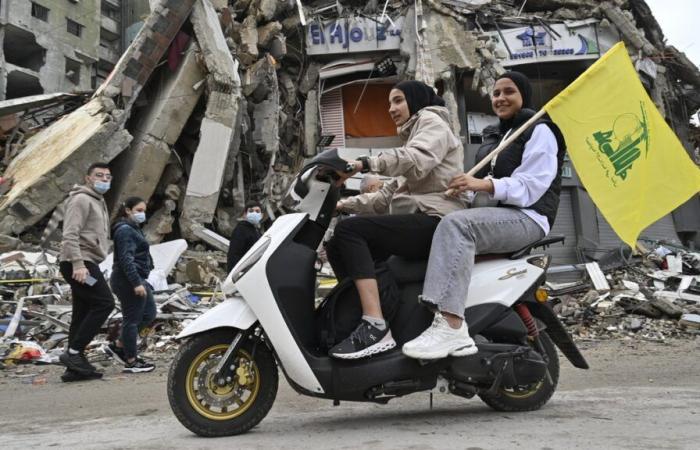Israel and Hezbollah have just reached a ceasefire. How long will it last? Is this a glimmer of hope for Gaza? Here’s what the experts think.
Felix Wellisch, Jerusalem / ch media
More from “International”
After fourteen months of war, the guns fell silent Wednesday morning at 4 a.m. local time between Israel and Lebanese Hezbollah. In the hours leading up to the ceasefire, a series of heavy Israeli air raids rocked Beirut. On Sunday, Hezbollah fired another 250 rockets at Israel, one of the largest salvos since the start of the war. The message seemed clear:
“We can if we want”
However, this Thursday, the ceasefire adopted Tuesday evening by Israel seems to be holding.
To reach an agreement, Hezbollah renounced its desire to impose a ceasefire also in the Gaza Strip. It must be said that the militia supported by Iran had to face massive losses in the last three months. Among the almost 4,000 Lebanese killed since the start of the war are, in addition to many civilians, a large part of the Hamas leadership team, including its long-time leader Hassan Nasrallah.
Furthermore, Israel claims to have destroyed nearly 80% of the militia’s rocket arsenal. Will both sides respect the sixty-day ceasefire and will this first step end the war?
International gendarmes
According to media reports, the agreement set a truce period until the end of January. During this period, the Israeli army is expected to leave Lebanon and Hezbollah to withdraw to areas north of the Litani River, which is approximately 30 kilometers from the border. The Lebanese army announced the deployment of 10,000 soldiers in the border area. This largely corresponds to the conditions of UN Security Council Resolution 1701, which ended Lebanon’s previous war in 2006, but which was never strictly implemented.
What is new, however, is that the United States and four other states will monitor compliance with this agreement. Apparently, they will also grant Israel, in a separate document, the right to carry out attacks in Lebanon if necessary. However, these can only be directed against direct threats, if the Lebanese army does not intervene against them. It is unclear to date to what extent Hezbollah can continue to exist as an armed militia.
The Israeli security cabinet approved the proposal late Tuesday evening by a majority of 10 votes to 1. Succeeding in separating the war in Lebanon from that in Gaza, against the wishes of Hezbollah, is a political success for Netanyahu.
The Minister of Police, the nationalist Itamar Ben Gvir, spoke of a “historic error”. However, he did not threaten to break up the coalition. According to political scientist and Netanyahu expert Gayil Talshir, the settler movement ultimately sees Gaza as more important:
“They want to impose a military occupation and recolonization there”
Gayil Talshir
Pressure from Washington
Ironically, the criticism comes from evacuated communities in the north, the very people who were supposed to benefit from this decision. The war has displaced more than a million Lebanese and around 60,000 Israelis. Avichai Stern, mayor of the northern Israeli town of Kirijat Shmona, called the deal a “surrender pact” and called for the establishment of an Israeli buffer zone inside Lebanon.
On Tuesday evening, Netanyahu warned that Israel would respond extremely strongly to any violations.
“The duration of the truce depends on what happens in Lebanon. If they rearm, we will attack.”
The imminent change of power in the United States appears to have played a decisive role in this agreement. Election winner Donald Trump had demanded that the war end quickly, and Netanyahu knows his country depends on support from the United States. Furthermore, the outgoing American president, Joe Biden, is also said to have exerted pressure.
Hamas also hopes
Iran welcomed the ceasefire on Wednesday. Sima Shine, of the Israeli think tank Inss, believes that Hezbollah and Tehran really want to end the war. “It’s about saving what’s left of Hezbollah on the political and military level,” explains the former Israeli intelligence agent and expert on Iran. In addition, Iran wants to “make a clean sweep of the past” before Trump takes office.
After the end of the fighting in Lebanon, Hamas said it was “ready for a ceasefire and an exchange of prisoners,” a spokesperson said. Biden also announced a new attempt to end the fighting in Gaza.
However, the effects were not really felt on Wednesday. At least fifteen people were killed in attacks by the Israeli army, according to emergency services. At the same time, the winter rains which have started to fall are aggravating the already catastrophic situation of some two million displaced people. Political scientist Sima Shine doesn’t believe Netanyahu wants to commit to ending the war in Gaza:
“He himself declared that after the war, the time would come for new elections in Israel and a review of the events of October 7. He doesn’t want to come to that.”
Sima Shine






